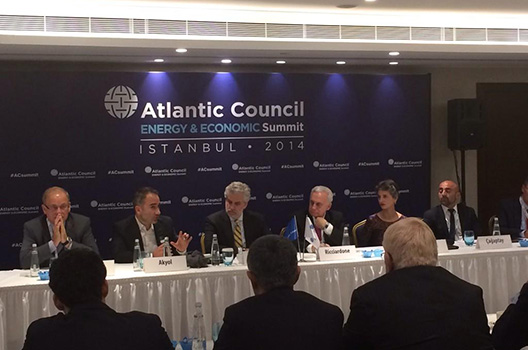 In a warm up for the opening of tomorrow’s Atlantic Council Energy and Economics Summit, participants held a pre-Summit dialogue focused on how nation states can deal with rising nonstate powers across the Middle East.
In a warm up for the opening of tomorrow’s Atlantic Council Energy and Economics Summit, participants held a pre-Summit dialogue focused on how nation states can deal with rising nonstate powers across the Middle East.
The Islamic State of Iraq and al-Sham (ISIS) was a hot topic of discussion at Nation State vs. Nonstate Dynamics in a Disintegrating Region – Security Outlook 2015, as participants grappled with how Turkey and its partners and allies to the West can prevent the extremist group from solidifying its foothold in Syria and Iraq. The panel discussion featured the Atlantic Council’s Francis J. Ricciardone, Barry Pavel, Frederic C. Hof, and Barbara Slavin, along with journalist Mustafa Akyol and Soner Çağaptay of the Washington Institute for Near East Policy.
Akyol argued that the Middle East is experiencing growing pains as the region struggles with questions of identity following the Arab Transitions of 2011. “The view that the Arab world is passing through some of the experiences that Europe passed through a couple of centuries ago is true,” said Akyol, adding that it took Europe centuries of religious wars, ethnic conflicts, and even two world wars before it reached the “liberal solution” with the establishment of the European Union.
Growing sectarianism and ethnic tensions across the region have empowered organizations looking to exploit these divisions, including extremist groups like ISIS, Jabhat al-Nusra, and Hezbollah. “We have a complete collapse of governing legitimacy in Syria,” explained Hof, “and groups like ISIS have moved in to fill that vacuum.”
Panelists looked to nuclear negotiations between Iran and the P5 + 1 as a potential opportunity to foster cooperation in the region. Slavin told the audience that Iran is at the heart of both the problem and the solution of disruptive nonstate groups, as the Islamic Republic uses its affiliation with Hezbollah to bolster the Assad regime, even as it worries about the rise of ISIS and other Sunni extremist groups in Iraq and Syria. A breakthrough in negotiations with Iran over the nuclear issue could pave the way to further cooperation on other security issues, Slavin explained, as Iranians look to play a bigger role in regional affairs and are open to further cooperation with Saudi Arabia. Others, including Çağaptay and Hof, were more skeptical that Iran would be willing to give up its Shiite ally and allow the Assad regime to collapse.
Discussion turned to a number of other topics, including Tunisia’s successful democratic transition, to Western governments’ response to the overthrow of former Egyptian President Mohamed Morsi.
For more from the panel, check out our Storify:
Be sure to follow @AtlanticCouncil and use #ACSummit to keep up with the latest news from the Atlantic Council Energy and Economic Summit.
Eric Gehman is assistant director for publications and communications at the Atlantic Council. Follow him on Twitter @ericgehman.
